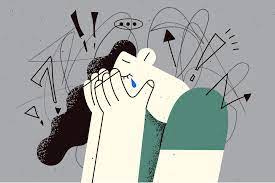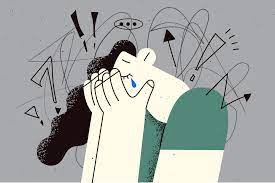The Political Advantages of Nervous Exhaustion
A Continually Drowning Person Will Grasp at Anything Offering Safety
Thanks again to American Thinker for running this piece. You can visit the website at: https://www.americanthinker.com/
Humans, being humans, tend not to make to make the best decisions in moments of panic.
The usual processes of weighing options and cost/benefits, taking time to recall what has worked in the past in similar situations, and ethical considerations can fall by the wayside when trying to decide – in a split second – which way to run.
Everyone has faced these terrifying – but hopefully transitory - instances in their life. Sometimes the decision works out, sometimes not.
But what happens when that dreaded decision whether to jump right or left in the face of an on-coming car is not a once or twice in a lifetime decision, but a daily question? That constant state of trepidation grinds on people, placing humans into a state of making most if not all decisions from a place of panic instead of reason.
And it is during that constant state of nervous exhaustion – a state often manufactured out of whole cloth by its potential beneficiaries - when those who wish to wield power in society strike.
This is far from a new phenomena or a fact that can only be ascribed to certain political outlooks. A population on edge is more susceptible to practically any “plan” that may claim to end the panic and can be rather more easily controlled by being focused on a common outside enemy (however it is defined).
Creating a problem – or a fear – allows those in (or those who desire to gain) power to claim they know how to solve that problem, to assuage that fear. The neat psychological trick in this process is that the problem does not to be real and those touting the problem can have actually created the “solution” they offer to the public even before they created the problem because the solution almost always involves ceding power to those who claim to have discovered the problem and, practically simultaneously, offer the solution.
Clearly, issues arise in the course of time legitimate concerns that should truly worry a society as a whole – the prospect of war, for example, usually stems from an organic process (at least in free societies.
But creating – and maintaining – a fear offers potential benefits that go well beyond such natural, for lack of a better term, situations.
Imagine for a moment a leaky roof. A roofer is called, the problem is assessed, and the problem is fixed.
Now imagine that roofer has surreptitiously created the problem and calls you before even notice the leak. That seemingly clairvoyant roofer then claims that the problem is so bad the entire roof has to be replaced or you and your family will die from the damp. Terribly worried and feeling rather off-kilter, you agree to the repair, a repair that takes forever and never quite seems complete.
The roofer is in heaven while you and your family are miserable and irritable and, quite possibly - because the roofer insisted the repairs be made with unalloyed platinum due to the local codes and regulations and science or whatever – broke.
Now imagine that problem writ large, across an entire society.
From COVID to Climate Change (not global warming – that was changed for PR purposes because by definition the climate is always changing so it cannot be readily challenged) to the idea of an embedded, virulent, and perpetual systemic racism to whatever happens to be latest thing the paid professional Twitterati are claiming, the never-ending sense of dread created is extremely useful when it comes to societal control.
And by the human tendency to seek out confirmation of belief, during these times people will flock to those information outlets that will reinforce their pre-conceived notions. On occasion, this impulse actually continues the spiral by emphasizing the fear. But even – oppositionally - when armed with the facts, the disquiet never quite goes away because the fear can often be replaced by utterly exhausting exasperation with and disbelief that others – no matter what, no matter the reason – will continue to be afraid.
By living in a constant state of “pure twitch,” people are made more malleable to accepting (or at least not complaining about) any idea that will make the twitching stop.
But the proffered solutions never quite completely work, in part because they are solutions to problems that either never really existed or have since faded. And, always lurking in the background is the unnerving sense that another “problem” will take its place in the near future which means the circle of fear – and the faux solutions proffered by the same people in the same, simply re-titled, jobs as during the first problem – is nigh eternal.
To be blunt, fear is a big business and only by shopping somewhere else can we end the cycle.




